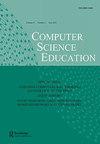反思对自动评分的影响:对编程新手的实证研究
IF 2.2
Q1 EDUCATION & EDUCATIONAL RESEARCH
引用次数: 0
摘要
自动评分器受到学习编程的新手的赞扬,因为它们为他们提供了关于他们解决问题过程的自动反馈。然而,一些学生经常在他们的代码中有错误时随意更改,而没有认真思考错误的原因。目的探讨要求使用自动评分系统的学生反思其代码中的错误是否会减少此类系统中经常出现的试错行为。方法采用配对t检验分析每个学生和每个问题反思的影响。学生在反思会话中解决问题的步骤比在常规调试会话中(4.33 vs 8.04)少,他们犯的语法错误,逻辑错误和运行时错误是一半。然而,他们的跑步间隔时间更长。本文提供的证据表明,在自动评分系统中要求反思可以提高学生的调试技能。关键词:反思性调试,编程入门课程,在线,可操作学习,分析,自动评分,编程新手披露声明,作者未报告潜在利益冲突。伦理批准本研究按照大学IRB进行,参考文献#15041。数据可用性声明在当前研究期间生成和/或分析的数据集https://doi.org/10.6084/m9.figshare.24188010本文章由计算机程序翻译,如有差异,请以英文原文为准。
Impact of reflection in auto-graders: an empirical study of novice coders
ABSTRACTBackground and Context Auto-graders are praised by novice students learning to program, as they provide them with automatic feedback about their problem-solving process. However, some students often make random changes when they have errors in their code, without engaging in deliberate thinking about the cause of the error.Objective To investigate whether requiring students using an auto-grading system to reflect on the errors in their code would reduce trial and error behavior often seen in such systems.Method The paper analyzes the impact of reflection per student and per problem using paired t-tests.Findings Students took fewer steps to solve the problem in reflective sessions than in Usual Debugging Sessions (4.33 vs 8.04) and they made half as many syntax errors, logic errors, and runtime errors. However, they took more time between runs.Implications This paper provides evidence that requiring reflection in autograding systems can improve student debugging skills.KEYWORDS: Reflective debuggingintroductory programming classesonline IDEactionable learning analyticsauto gradersnovice programming Disclosure statementNo potential conflict of interest was reported by the author(s).Ethical approvalThis study was done in accordance with the university IRB with reference #15041.Data availability statementThe datasets generated during and/or analyzed during the current study https://doi.org/10.6084/m9.figshare.24188010
求助全文
通过发布文献求助,成功后即可免费获取论文全文。
去求助
来源期刊

Computer Science Education
EDUCATION & EDUCATIONAL RESEARCH-
CiteScore
6.90
自引率
3.70%
发文量
23
期刊介绍:
Computer Science Education publishes high-quality papers with a specific focus on teaching and learning within the computing discipline. The journal seeks novel contributions that are accessible and of interest to researchers and practitioners alike. We invite work with learners of all ages and across both classroom and out-of-classroom learning contexts.
 求助内容:
求助内容: 应助结果提醒方式:
应助结果提醒方式:


